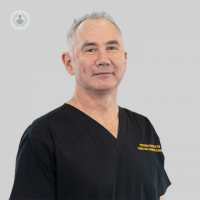How do I know if my child has a drug allergy?
Written in association with:We asked leading paediatric allergist, Professor George Du Toit, to explain more about drug allergies in children, what the symptoms of an allergic reaction might look like and what you should do if your child experiences one.

What are the typical symptoms of an allergic reaction to a drug?
Adverse reactions to drugs can generally be classified as allergic (or immune-based), or non-allergic. Typical immediate-onset allergic reactions are thankfully rare as they can be severe and even life-threatening. Symptoms may include hives, swelling, vomiting, wheezing and occasionally, anaphylaxis. Non-allergic adverse reactions are more common, many of these are predictable and are often dose-dependent; an example being vomiting and gastrointestinal upset after commencing oral antibiotics.
If I have an allergy to a certain drug, will my child be allergic too?
Medication allergies, such as a penicillin allergy are generally not inherited. The purity of medications such as penicillin has also improved over time so the penicillin your grandmother reacted to would be different from the medications currently in use. However, there are some adverse reactions to drugs that may be passed on; for example, certain patients (Han Chinese) may be more susceptible to carbamazepine cutaneous reactions.
Can I test my child before giving them the medication?
There are diagnostic tests that can be performed if a drug allergy is suspected but the testing approach and accuracy depend on the specific drug under investigation. For example, antibiotics are best tested through a drug provocation test where small increments are given in a safe and controlled setting of the index antibiotic. This is only performed if the initial reaction was not severe. These are typically negative which implies that the rash and symptoms associated with the reaction are likely to have arisen due to the underlying infection and not the medication (such as ibuprofen or amoxicillin) that was given for the illness.
For other drugs, such as anaesthetic agents, these can be tested by intradermal tests and for others, blood tests such as latex and chlorhexidine. Any suspicion of drug allergy should be assessed by a specialist allergy clinic.
Being allergic to pollens and food does not put you at risk of drug allergy.
What should I do if my child develops an allergic reaction?
If a drug-induced reaction is suspected, then the next dose should be omitted and medical advice sought. This is especially important if your child is experiencing immediate-onset allergy symptoms or troubling delayed symptoms, such as redness and peeling of the skin and mucus membranes (the lips and eyes). You should always report any adverse reactions to your doctor and stop the medication. Your doctor will then advise on frontline analgesics which are safe for your child.
If you are worried your child might have a drug allergy and would like to talk to a specialist, visit Professor George Du Toit’s Top Doctors profile and book a consultation with him.


